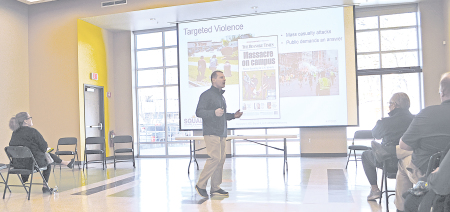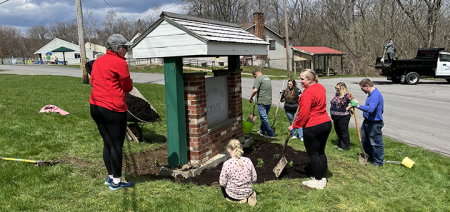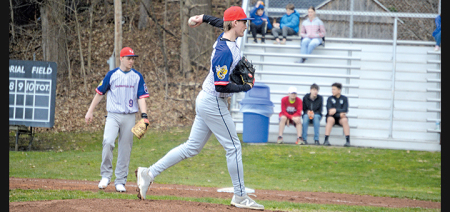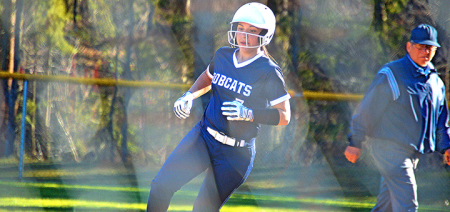PROGRESS 2021 – Raymond: Investing In The Future Was The Best Way To Overcome COVID
Published:
February 10th, 2021
By:
Tyler Murphy
 Above a Raymond welder works on the factory assemblyline in Greene. The company performed very well mostly due to the fact they have always invested in cutting edge technology in order to remain competitive.
Above a Raymond welder works on the factory assemblyline in Greene. The company performed very well mostly due to the fact they have always invested in cutting edge technology in order to remain competitive.
GREENE - Raymond certainly faced challenges in 2020, dealing with changes in production, supply and a handful of employees falling ill.
Overall, the company performed very well mostly due to the fact they have always invested in cutting edge technology in order to remain competitive in their international material handling market.
Before the pandemic one of Raymond’s strengths was developing advanced fork trucks, including those powered by hydrogen fuel cells or lithium ion batteries, but just as significant are the computer programs they created that monitor, process and control the movement of goods through a company.
Speaking of the pandemic Raymond CEO and President Michael Field said, “It has really reinforced what’s important to all of us, and how the small things in life are the most valuable to us. But from a corporate perspective, I think it really helps you understand how important the contributions of your people are, and the level of leadership from people that you didn’t necessarily anticipate you would see it from.”
Field has worked for Raymond for 19 years, the company will celebrate its 100th anniversary in Greene in 2022.
“We’ve got leaders from all levels of the organization who stood up, took over initiatives and found ways to be successful. We just accomplished things that I didn’t believe were possible before in this last 10 months.”
Raymond was leading a technological race in the industry, creating ever more efficient trucks and programs. The demand for these automated systems became ever more crucial when COVID hit, especially in an essential industry that had no choice but to keep the supply lines functioning.
“The workforce has really just pulled together and has been flexible. The Raymond Corporation was declared an essential business by the State of New York because we’re responsible for supporting businesses and food distribution, obviously warehousing, medical supply, the overall supply chain.”
“COVID has probably sped up some of the changes that were taking place previously, particularly with our largest customers continuing to grow and us having stronger and stronger partnerships with them,” said Field.
Overall the industry saw its markets contract roughly five percent, but Raymond bucked this trend and still managed to see growth. Raymond also continued to develop and launch new products and secure new customers during the pandemic.
“Our most critical operation is in manufacturing, but beyond manufacturing we have all of our corporate engineering functions. We have so much technology and innovation going on, you’ve got lab work and research happening, then you also have all of the corporate functions,” he said.
Employees and business learn to adapt
“Quite frankly from my role, there’s never been a time when I’ve been more proud of our workforce in the way that they’ve truly gone above and beyond in responding not only to COVID challenges, but responding to taking care of our customers,” said Field.
“Our people were tremendous each day in recognizing that there was a new process in place, we were improving them all of the time, and they really worked with us to be able to continue to run, and run very efficiently.”
One of the effects of COVID was commercial customers realizing the critical importance of keeping goods on the shelves and the challenges facing supply chains, especially as shortages took effect.
“A lot of our customers who had substantially increased demand really relied on us to support them so they could take care of their customers,” he said.
Raymond elected to shut down initially for about eight days after New York State announced the health requirements for companies. The company decided to close its regular production during that time so it could form a response team and focus on implementing changes to their facility so work could resume safely.
“A lot of our engineering people, our HR people and our manufacturing leadership were there around the clock, making changes to the facility – putting up new barriers, spreading out positions, working on installing new entrances to the building where if your temperature ran high you wouldn’t be allowed in, it kind of locked you out of the system until it was responded to. So, we took that period of time to really ready ourselves and ready our processes.”
Like most major corporations, Raymond had a contingency in their emergency planning that also included what to do in case of a global pandemic.
The company’s risk management committee reviewed those plans along with a core group of long-time leaders, most have worked there more than fifteen years. Drawing on health experts’ advice and their own experience the group looked at tabletop exercises examining how the company could respond to the pandemic. They took their preplans and updated them to better fit the specifics of the current crisis.
“When we decided that we were going to keep the factory running, the priority was that we were going to have the people who could work remotely do that, so we made the decision and within 48 hours we had 700 people working from home. Our IT organization set up a network, supported our employees, and we did this almost flawlessly. It was again, people standing up and figuring out how to do things that we had never considered before.”
Field also said it was hard to adapt to the unknown and the fast-changing expectations at the onset of the pandemic.
“In a short period of time — I think that our culture around continuous improvement and management practices helped drive this, particularly developing standard work — we had specific standard work that was structured for everything from cleaning inside the facility, to what density we would have in the building, how conference rooms would be structured, temperature taking at the doors, etc. Because we have a good infrastructure and strong manufacturing engineering team, we were able to put those in place very quickly.”
In putting these new processes in place Field explained he and the company were reminded of just how important investing in internal resources and employees really is. He said before Raymond began looking outward it took a long, hard look at its internal teams and systems to make sure they were the best they could be.
“Our people were exceptional. As I look back, it’s really is incredible to me how few problems we had. We really focused on communication, education, understanding and explaining why we were doing things, but the great majority of our workforce understood what we were doing was important, that we are important to the economy, and it kind of gave us something to fight for. And I think people have pride in that, and it made people go above and beyond their performance to get the job done,” he said.
Contrary to another trend, instead of laying-off workers during the pandemic Raymond has sought to fill needed positions.
“At this point, one of our biggest challenges has been the need to hire additional staffing to support our buy-ins. So, we did have hiring going on the entire year.”
The company had to get creative, holding drive-thru career fairs and other non-traditional and often virtual, recruiting programs. Raymond has more staff now than it did a year ago, adding about 75 more staff members to their manufacturing headquarters in the Village of Greene.
Market demand for automation and efficiency grows
There was a significant increase in food distribution demands and e-commerce during the pandemic as most of us started purchasing items online more than ever before. Addressing both these demands were key parts of Raymond business model.
“Warehousing, lean management and logistic solutions is really the heart of our business. So as those organizations grew both in equipment usage,” said Field.
Raymond has increased manufacturing capacity during the pandemic and accelerated development and implementation of cutting-edge data tracking and warehouse management systems. The systems were used to increase Raymond productivity and were also products they sold to other commercial customers.
“We focus on the words: optimize, connect and automate. Step one is to optimize our customer’s present processes and tools. The second step is to connect, which is setting up the data piece so you have better information that you’re making decisions on. And then finally when those things are in place, the third piece is providing automating products that provide more value to our customers.”
“It’s really those three steps working together,” Field said.
The company worked towards making more connections, processing more data and information, and focused on increased automation, all of it accelerated and more profitable due the pandemic.
“I do think that, post-pandemic, we will come out as we are now, a stronger organization, and I think that our larger customers are seeing us as more of a solutions and technology partner rather than just a truck provider.”
Raymond worked to find opportunity in the crisis by providing solutions to other companies struggling with the fallout from the pandemic. They continued to launch new products as customers’ demand for both fork trucks and technical support grew.
“Customers are looking for more technology because they recognize the environment that they’re in with COVID being a risk to them and with shortage of labor. So, we brought some new automation products to market that we’re very proud of,” said Field.
Raymond Energy Essential Business was one of those offerings.
The company launched a new lithium ion set of batteries for fork trucks. Seen as the next generation of power, they provide a number of advantages over older sources. Field said customers were excited to see the new technology.
“We certainly think it’s the future. And again, I’m so proud of the engineering team and supply base to be able to work in this environment and bring new products to market, maybe even faster than we would have because there’s more of a sense of urgency.”
Field said the next few month will depend greatly on the company’s leaders and how the government responds next.
He said the leadership team at Raymond had a positive outlook.
“We reviewed what we thought about the next three to six months and it was a very optimistic assessment.
The pandemic has strengthed e-commerce, a part of the economy Raymond services very well. It has also generated closer partnerships with customers.
“So, the forecast for our business is very positive, both with orders that they’re taking today and also business that we anticipate to gain in the next six months. They’re indicating that their customers actually feel good about the future,” he said.
“I think a part of that is the vaccine, they’re optimistic, they’re looking to spend money and they’re looking to invest to be more efficient. And that’s where our products and our expertise around lean management helps to support that.”
Help the community, help your families
Field said Raymond is in regular contact with the Chenango Department of Health and participates in a weekly call with local organizations and the hospitals.
“We’ve had a strong partnership with UHS where they are monitoring any Raymond associate who has any type of symptoms - we have a medical provider talk to the individual to make sure that they’re getting whatever resources they need,” he said.
“I don’t think we can thank them enough for the level of support that they have provided to Raymond, and more importantly to the entire community. They’re really the heroes in this whole process.”
In a normal year Raymond and their employees support a number of community events and charities and the company remained committed to that. Since most fundraising events were canceled, Raymond decided to reach out and donated more.
“We continued to support all of the organizations that we did previously. Most of them couldn’t have events or do those types of things, so we provided more financial support this past year,” said Field.
When there was a shortage of protective equipment in the area Raymond tasked their engineers and staff to create their own and shared them with those in need.
“The most unique thing that we did I think, that in the midst of trying to prepare our facilities and take care of our people, one of our engineers came up with the idea of producing face shields to help our medical providers. “
The company produced 2,500 face shields and donated them to local frontline medical workers.
“They were very high quality and we were able to support everything from the local veterans’ office, local hospitals – the impact was really brought home to me when we had a small local medical provider and they called looking for just three or five of these face shields.
“When Raymond responded by presenting far more than requested Field said health representative had tears in their eyes.
“They said that this was the difference between them having to close or being able to take care of people,” he said.
Living in a small town, a number of Raymond employees have family members working as healthcare professionals, as was the case for one engineer.
“One of our engineers had an expertise in 3-D printing, and his mother was a nurse so he was obviously concerned about the lack of PPE, so it was a personal mission. He started looking online and people were sharing drawings, so we took that initiative and his capabilities on our 3-D printer, put it together with our lead manufacturing and we were able to put together a small assembly line. So, it wasn’t related to anything that we already make, but we’re good manufacturers and it proved out in this case,” said Field.
The company also modified its traditional toy, clothing and food drives this year but still supported a version of the events.
Employee volunteers dropped off blankets and toys for their holiday campaign. The company also usually provides about 1,000 turkey dinners for Thanksgiving. This year the company provided the meals at a drive-thru pick up instead.
Field hopes a vaccine will begin a return to normalcy. “There’s no way to accelerate getting through this. It does require a sense of patience, a bit of self-sacrifice and some compromise. “
The company hopes to celebrate in 2022, as it marks their 100th anniversary, and hopefully a year free from the pandemic.
“I’m really looking forward to that opportunity. We’re tremendously blessed with the quality of people and with the supply base that we have in the region. We have so much knowledge and expertise in our people and our factory,” said Field.
“A part of us we always reinforce, is that we love the idea of the small company feel of being in Greene. But at the same time, we’re part of this global organization, so we really try to take the best of both worlds and we feel fortunate to have that.”
Author: Tyler Murphy - More From This Author
Comments








